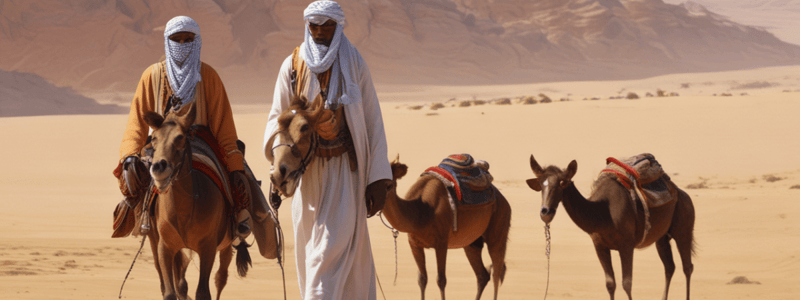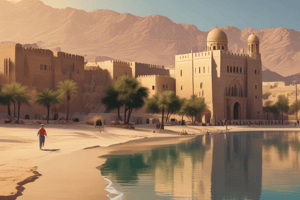Podcast
Questions and Answers
True or false:Oman is located in the north of the Arabian Peninsula.
True or false:Oman is located in the north of the Arabian Peninsula.
False (B)
True or false: Bedouins in Oman used to live in the mountains.
True or false: Bedouins in Oman used to live in the mountains.
False (B)
True or false: Frankincense played an important role in ancient trade routes.
True or false: Frankincense played an important role in ancient trade routes.
True (A)
True or false: The frankincense tree can grow in any climate.
True or false: The frankincense tree can grow in any climate.
True or false: Mosine is a mathematician who studies the frankincense tree.
True or false: Mosine is a mathematician who studies the frankincense tree.
True or false: Omani seafarers were excellent navigators and invented the sextant.
True or false: Omani seafarers were excellent navigators and invented the sextant.
True or false: The frankincense trade brought different cultures together.
True or false: The frankincense trade brought different cultures together.
True or false: The port of Manzala was a thriving frankincense market in ancient times.
True or false: The port of Manzala was a thriving frankincense market in ancient times.
True or false: Bedouins in the mountains cultivate palm groves and fruit trees.
True or false: Bedouins in the mountains cultivate palm groves and fruit trees.
True or false: Jebel al-aqdar experiences violent storms in the summer months.
True or false: Jebel al-aqdar experiences violent storms in the summer months.
Flashcards are hidden until you start studying
Study Notes
- Oman is located in the south of the Arabian Peninsula and is known as the Orient of the Thousand and One Nights.
- The land is home to the once-nomadic Bedouins who lived in the desert.
- Frankincense is a precious treasure found in the far south of Oman and played an important role in the trade routes of ancient times.
- The Bedouins were originally nomadic herdsmen who moved from place to place with their camels and traced the caravan routes through the vast desert.
- The frankincense tree needs a specific climate, and the nedge region in Oman produces the world's finest frankincense.
- Mosine, a PhD in biology, is a guardian of the frankincense tree and devotes his time to studying and understanding it.
- The Omani seafarers became excellent navigators and gave the world the first instruments like the sextant, thus laying the foundations of modern navigation.
- The frankincense trade connected communities and wove bonds between different peoples and their cultures.
- The port of foreign played a significant role in the frankincense trade, and different civilizations vied for control over it.
- Manzala, a legendary site in Oman, was a thriving frankincense market in the Middle Ages.
- The video explores the lives of Bedouins in Oman.
- The Bedouins have a strong connection to the land and its traditions.
- Frankincense harvesting is an important tradition for the Bedouins.
- The rub al-kali is a vast desert that covers one-fourth of the Arabian peninsula.
- The desert is a hostile environment, but also a source of inspiration for poets and adventurers.
- Bedouins in the mountains cultivate palm groves and fruit trees, such as date palms.
- Bedouins in the mountains have settled there to cultivate their trees and continue their ancestral way of life.
- The Bedouins live a solitary life in the mountains, but maintain their connection to their community and traditions.
- Water is a crucial element for life and is used for irrigation in the mountains.
- The Bedouins pass on their traditions and knowledge to the next generation.
- Jebel al-aqdar is a mountain in Oman where the village of balatzit is located.
- The village is dependent on an irrigation system called felagues.
- The water masters, like Ahmed, are responsible for maintaining and distributing water through the felagues.
- The felagues have been classified as a world heritage site.
- Life in Jebel al-aqdar depends on the felagues and the transmission of knowledge from one generation to the next.
- The climate in Jebel al-aqdar is different from the rest of Oman.
- The mountain experiences violent storms in November and December.
- The Bedouins in Jebel al-aqdar have an oral tradition and are the keepers of age-old secrets.
- The water masters work to preserve the history and heritage of the felagues.
- Living in isolated regions like Jebel al-aqdar is preferred over living in the city.
Studying That Suits You
Use AI to generate personalized quizzes and flashcards to suit your learning preferences.




